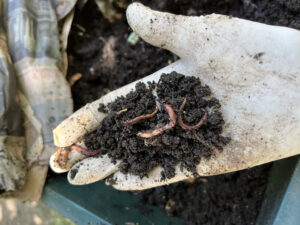About 15 years ago, I took a workshop on worm composting given by the City of San Jose. It changed how I approach fertilizing my organic plants and fruit trees. No more kitchen scraps and newspapers thrown in the garbage. Now those items are fed to some very hungry worms (the Mercury News uses soy-based print) who gobble them up and provide me with lots of casings (poop) that are chuck filled with nutrients.

Although any box can be used to house the worms, the container needs holes to let in air and moisture. The City provided me with my first bin, and I filled it with dirt, newspaper, kitchen scraps (no meat and citrus skins) and I sent away for my first (and last batch) of red worms. When the worms arrived, the bin was ready. I just made sure the inside contents were damp. When I added the worms, they immediately hustled to the bottom of the bin. Once or twice a week, I checked and added scraps and moisture if needed. Too many kitchen scraps will cause the bins to smell and attract critters. Soon I outgrew the one box I started with and purchased an attractive green mini-farm with 5 bins that sit on top of each other. I keep it above the ground in the shady part of the yard (too much sun means too much heat and it will kill off the worms). It’s amazing how fast worms seem to procreate given the right environment.
Every 3 months or so, I take the bins and empty them upside down on newspapers (usually one bin at a time). The worms automatically move to the bottom to avoid the light. I start new bins with newspaper, dirt, and scraps and have them ready to go. I carefully separate the worms from the casings and toss them in. Then I collect the casings and spread them around my trees and plants. When there are lots of worms, I simply let them loose in the shade under a tree, making sure the ground has debris for them to hide in. They quickly disappear into the earth. I’m sure they are very happy, and my yard is too!
I don’t spend much time on my hobby and the benefits are great. My yard looks terrific, and I haven’t bought fertilizer in years. Kitchen scraps are never tossed in the trash. What doesn’t go into the worm bins, goes into the compost heap.
Worm composting has been so successful for me that I have taught friends and neighbors how to do it and given them plenty of worms to start their own bins. My 5-year-old grandson is the most enthusiastic fan of my hobby and is always willing to help me harvest the casings. He now has his own worm bins at his home. I know I am doing something to help the environment, and I share my knowledge (and worms) with others in the community.
I hope you might consider making this your hobby too.
